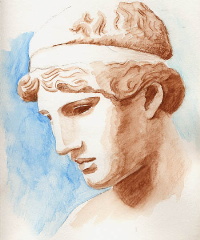Catchup 4: His Dark Materials trilogy
Time to recommend more reading material. I just re-read Philip Pullman's His Dark Materials trilogy and am a little annoyed at the number of people who compare this series to the Harry Potter books. Frankly, for complexity of character, originality of setting, the epic-level of conflict and the sheer scale, this series cleans Harry's clock.
It starts in The Golden Compass, with young Lyra growing up wild amidst the stodgy scholars of Oxford. But it's a subtly different world that the one we're used to - the technology seems to be hovering around the turn of the twentieth century, when gaslight is slowly giving way to electric (or 'anbaric') power, and people all have a physical manifestation of their soul that takes the shape of an animal called a daemon, who is with them all their lives. The church is a much more powerful force here than in our version of reality, and the study of physics becomes 'experimental theology'. Lyra comes into the possession of a device of great utility, the Golden Compass of the title - a 'truth-teller' which will answer any question if you understand how to read it. With this, she uncovers a great conspiracy that is in motion to cement the power of the church over humanity's affairs forever.
Book Two, The Subtle Knife, starts in OUR version of reality with Will, a twelve-year-old with far more responsibility that he can handle, the sole care of his mother, who frequently looses her grasp on reality. Sinister men are looking for papers left by Will's father, an explorer who vanished when Will was a baby. Will soon joins us with Lyra in a place between their two worlds, and Will learns the art of going between worlds via the Subtle Knife of the title.
Book Three, The Amber Spyglass, brings in a third significant character, Mary - a physicist from Will's (and our) version of reality, a researcher studying Dark Matter that may make up the bulk of the universe. The nature of His Dark Materials becomes more clear, as the trio work to prevent the exodus of this cognitive stream of subatomic particles from the cosmos, to the destruction of everything meaningful.
Why they call this a children's fantasy series beats me - it's pretty dark and grim in places; children are victimized in the most gruesome ways, and very meaningful characters meet really heartbreaking ends, some nobly, some just wasted by the forces at war.
I think the only thing that has prevented Christian Fundamentalists from burning these books is that they have never read them; I suspect the vocabulary is a bit beyond most fundies' skills. But if they knew about them, they would surely protest them, so annoy a fundie today - buy and read these books. If you need further proof and don't mind spoilers, highlight and read the following blank-block - if you don't want the story spoiled, avoid the blank block.
God is a fraud - just another of a 'race' of angels who managed to persuade humans that he created the universe.


0 Comments:
Post a Comment
<< Home